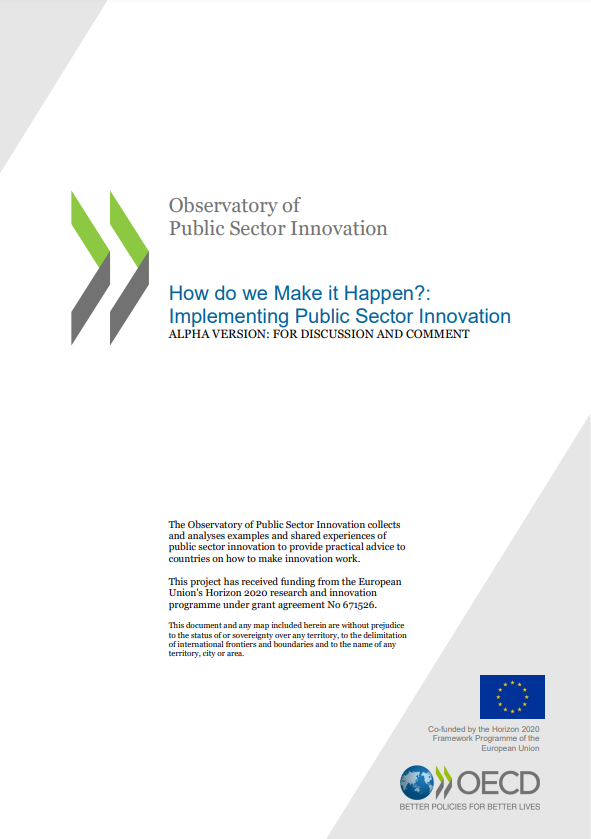How do we Make it Happen?: Implementing public sector innovation (Innovation Lifecycle 4/6)

Overview
When working through the phases of the innovation lifecycle, public sector innovators and innovations teams have undoubtedly put in a tremendous amount of time and energy in identifying a problem or problems that require and innovative solution, generating and filtering innovative ideas to solve the problem, and developing strong, evidence-based proposals to secure buy-in and support from leadership in order to get their proposals approved so they can act on them. As challenging as these processes have been, many of the most challenging aspects of the innovation process have not yet confronted those trying to make a difference in new ways. Taking the project from a proposal or business case, maybe even with a proof of concept or prototype, through implementation is a significant and difficult challenge. But when done properly, and with a bit of luck, implementation is where innovators can finally see the fruits of their labour and it is when others can finally begin to see the vision that the innovators who initiated the innovation process have had all along.
Governments have been implementing projects, including innovation projects, for centuries. Making innovation happen in the public sector was never easy, but not long ago it was more straight-forward, had fewer conceivable inputs and outcomes, and could be focused on discrete problems affecting perhaps just one organisation, policy, or service. However, the context is such project has changed dramatically over time and continues to change at an increasingly rapid rate.
Project implementation is the ongoing process of turning the ideas that have been generated, and successfully defended with a strong proposal and business case, into reality. The process can take weeks, months, or even years. It can start small and scale to major proportions, or it can fizzle out. In implementation, all assumptions will be put to the test with real-world uses and real-life users. There are a lot of considerations facing innovation teams as the embark on and carry out the implementation process.
Public sector innovators and innovations teams should not think they need to figure out every detail themselves, however. A body of knowledge, and a wealth of experiences gained by others—often the hard way—can be leveraged to take some of the edge off of implementing innovation projects. While it is impossible to condense every consideration and lesson learned to help innovators succeed, OPSI has worked through its collective experience in innovative capacities in national and city governments around the world, seeking to surface some of the most important elements of implementation, factors that enable implementation of innovation projects, contributors and channels for those who can help or hinder the success of the project, and hand-on tools and methodologies that innovations teams can leverage to avoid re-inventing the wheel and to help patch up knowledge and experience gaps.
Thus, this early alpha-version of a study on the implementing innovation projects phase of the lifecycle, seeks present relevant aspects of the innovation knowledgebase, as well as the experiences of the diverse OPSI team and the innovation community that we interact with on a regular basis, to outline key considerations and strategies for
innovators. In particular, OPSI seeks to:
- Lay out the dynamic nature of the last several years, and the indefinite future, that makes innovation today much different than innovation in the past.
- Outline the types of situations, opportunities, and challenges that innovators may face often unexpectedly, in implementing innovation projects.
- Surface steps and contextual factors that enable, or potentially hinder, implementation efforts, as well as some potential strategies for approaching them.
- Discuss some of the various people who can be contributors to implementation, and the channels by which they may be identified and engaged, and finally,
- Provide innovators with a series of tools and methods that can support their implementation efforts.
While the research efforts of the OPSI team are broad, and the innovation expertise diverse, the field of public sector innovation is incredibly dynamic and context-driven. As such, this report is in presented as an “alpha” early release version, with aim of seeking input from the innovation community to ensure the subsequent final product will meet the needs of public servants and their organisations.

How do we Make it Happen?: Implementing public sector innovation
Published on 1 February 2018.
